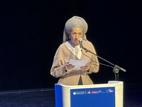On September 2h, Bishop Efraim Tendero, executive director of the Galilean Movement and global ambassador of the World Evangelical Alliance, delivered a speech named “Power and Integrity Call for Global Shift in the Missional Community”, calling for five reformations in the face of the current ineffective mission situation.
The left-behind reality of today's church mission was shown directly at the beginning of the talk. Bishop Efraim noted that the Christian population growth rate is much lower than the world population, causing more than 160 million unchristian population increase from 2000 to 2024.
Only one-third of the great commission task was accomplished even including the nominal Christians. “We are falling short of the Great Commission.” The Bishop pointed out.
Five reformations should be undertaken according to Bishop Efraim.
First, reform from the clergy-dominated ministry to every believer's ministry.
Through Acts 8 and Ephesians 4, Bishop Efraim said when persecution came, early Christians scattered everywhere in the known world, so as the proclamation of the gospel. At that time, the primary function of the church was to equip the believers, and every Christian was involved in the gospel ministry.
However, this kind of pattern has been replaced by a passive mindset that the great commission is only the responsibility of professional ministers and clergies since the time of Constantine when Christianity became a kingdom religion, when “the Roman Empire became churchly, and the world became the church, worldly.”
Using a metaphor of the army, the Bishop indicates the wrong recognition that in the church today, the generals undertake all battles and soldiers just sit at the sidelines, while a real army has a general giving instructions and full soldiers on the frontlines.
This is an “unfunctional” army, and believers should never be mere spectators, the Bishop urged.
Second, repent from my mindset and turn to Jesus’ authority.
This is the biggest problem that Christians always focus on “my authority, my problem, my possibility” which causes power struggles.
“If we treat our ministries under Jesus' Authority, then it will lead us to remember the prayer of Jesus in John 17 that they may be one, and that will result in we will enhance the entire body of Christ rather than just highlighting our ministries and points.” He continues, “we need to be a church that has only one hand that is our lord Jesus Christ.”
One authority inspires and also requires unity in the whole body of Christ. To pursue this, Bishop Efraim suggested the church pay great attention to avoiding duplication, eliminating competition, and enhancing collaboration.
“We are building the kingdom of God, not our empires.” He emphasized again.
Third, reiterate radical instead of nominal discipleship.
Bishop Efraim pointed to the incomprehensive and weak discipleship-making methods today.
Making disciples is the only strategy of the Great Commission given by Jesus Christ and to make it come true, there should be three methods: go, baptize, and teach. The church today does well in baptizing since we think highly of the number of people coming while neglecting “teach”.
Also, the content and the aim of the “teach” are not only about informing a message but, more importantly, teaching them to observe and obey Jesus’ commandments and live a transformed life.
He reminded all churches to make whole-life discipleship, which pursues to “obey all the Jesus’ commandments”, the radical discipleship that can only be accomplished through humility and forgiveness.
He encouraged all Christians to be not trapped in our insecurity and inability to love but to follow the full steps of Jesus Christ to love one another absolutely and unconditionally, just like Christ loved us.
Fourth, realign leadership to intentionally engage the younger generation.
Bishop Efraim then state briefly the aging problem of the church. Christ’s body is demographically older than it should be. The average age of the church is much older than that of the society.
Except for the youth population percentage, he also reminded that the strategy-making procedure and leadership structure of most organizations are not open to younger people so their opinions are barely represented.
“Do not relegate our young leaders,” Bishop Efraim urged the audience to listen to and work together with younger generations.
Fifth, revise the view of Jesus’ presence from mere security to inculcate accountability.
Bishop Efraim hoped everyone to change their shallow understanding of Jesus’ presence, which not only promises his comfort, companionship, and help in trouble, trials, and persecutions, but also means he sees everything that we do and knows everything that we say, “we can not keep secrets from Jesus.”
This right recognition will lead to the purity and integrity of Christians' lives. Lacking the two qualities had caused disheartening harm to the church's reputation, defamed our Lord Christ, and disputed the mission's effectiveness.
He exhorted all Christians especially leaders to “live with light and work in the light.”
Restate the five reforms again, the Bishop hoped the church with humility, purity, and integrity could bring up Christlike harvest workers everywhere, as the vision of the Galilean Movement, and accelerate the Great Commission.












